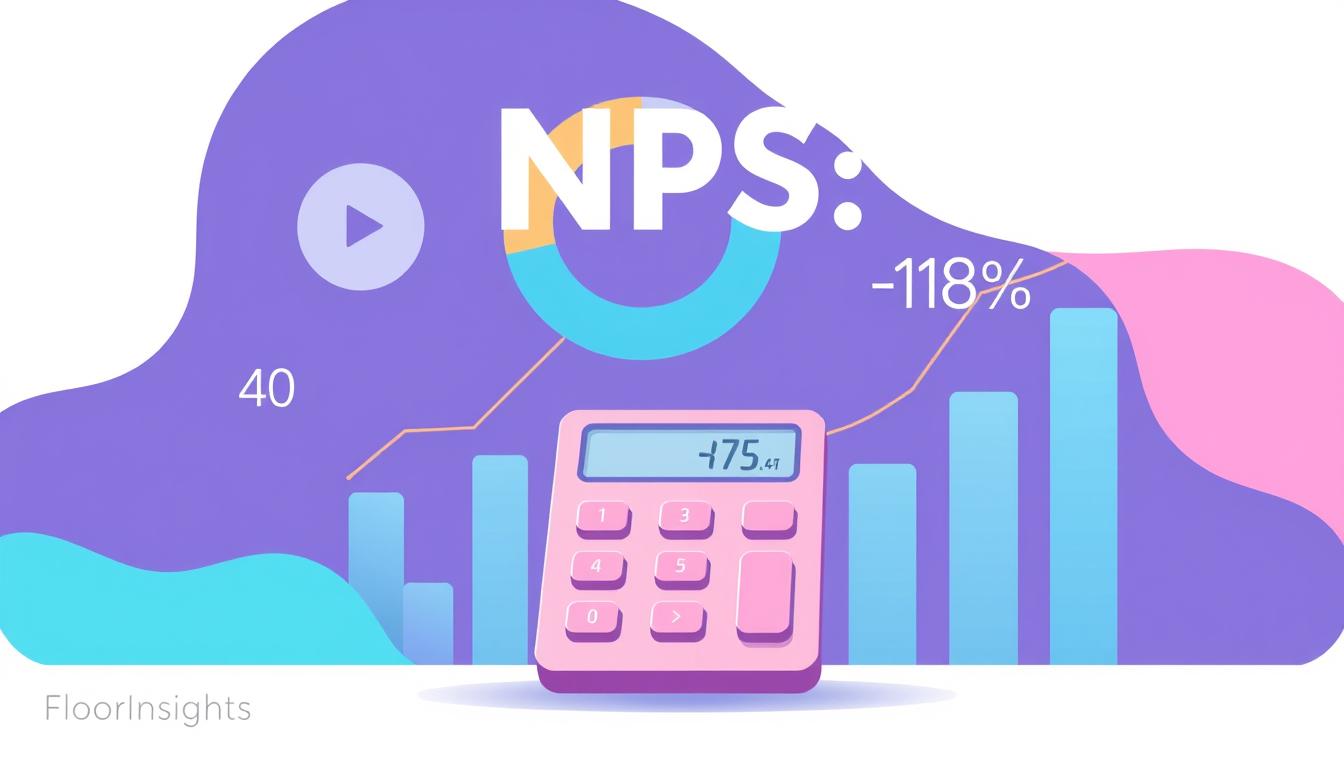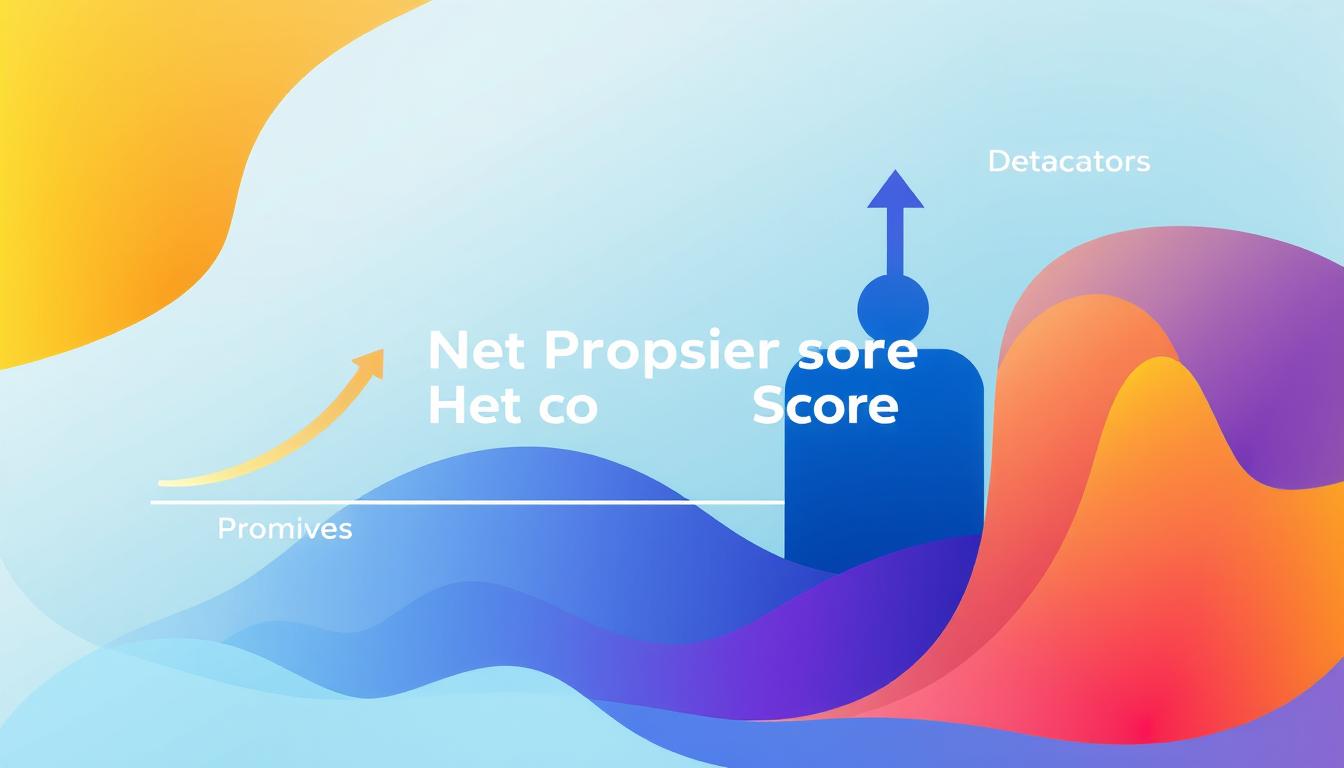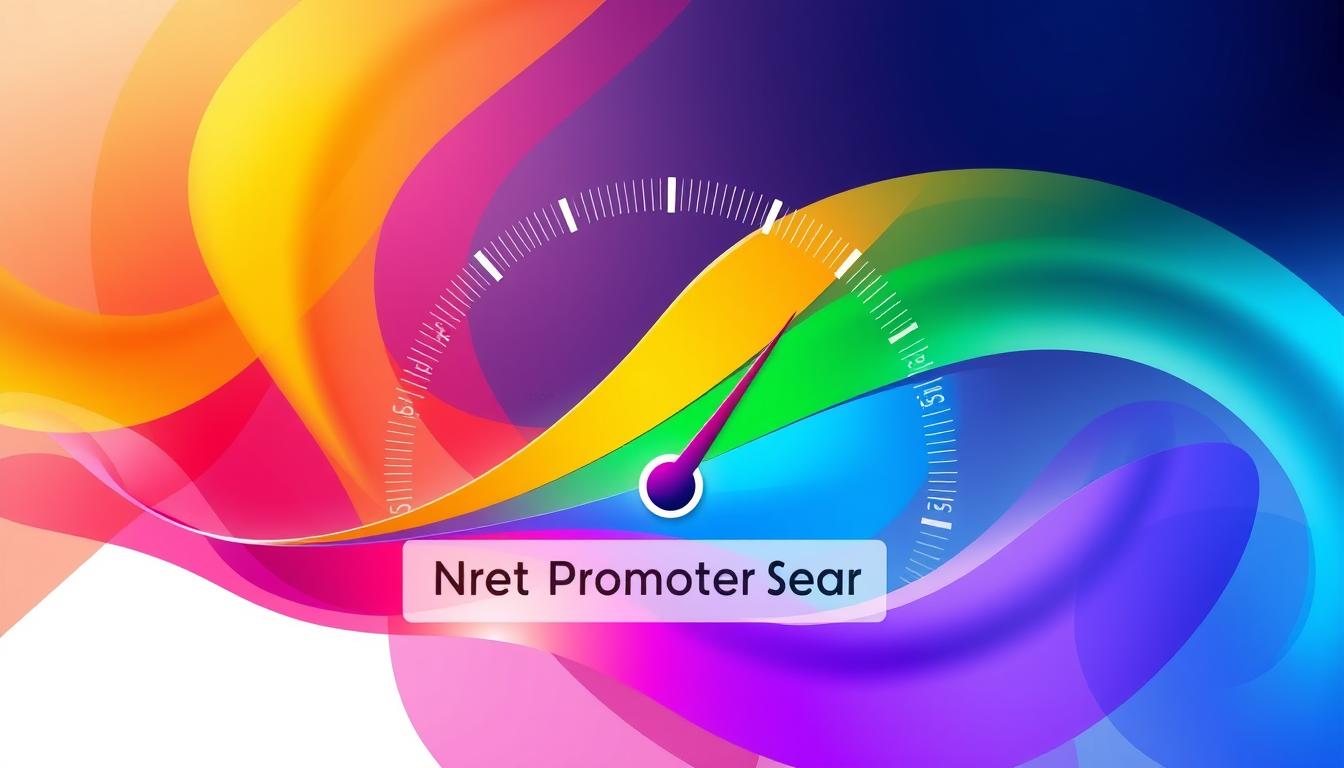In today’s competitive business world, finding ways to measure and boost customer loyalty and satisfaction is crucial. The Net Promoter Score (NPS) stands out as a key metric. It offers deep insights into customer feelings and aids in business growth. This article will delve into NPS’s importance, its impact on the customer experience, and how it can enhance brand advocacy, retention rates, and referral marketing.
Key Takeaways
- The Net Promoter Score (NPS) is a widely-used metric for measuring customer loyalty and satisfaction.
- NPS provides insights into customer sentiment and can help drive business growth by identifying areas for improvement.
- Monitoring and improving NPS can help organizations enhance the customer experience and stay competitive.
- NPS can be used to boost brand advocacy, retention rates, and referral marketing.
- Implementing an effective NPS program requires best practices for conducting surveys and acting on customer feedback.
Understanding the Net Promoter Score
The Net Promoter Score (NPS) is a key metric that gauges customer loyalty and enthusiasm. It’s a measure of how likely customers are to recommend a product or service to others. This is a strong indicator of customer satisfaction and brand advocacy.
What is the Net Promoter Score?
The NPS is derived from a single question: “How likely are you to recommend [company/product/service] to a friend or colleague?” Customers rate their likelihood on a scale from 0 to 10, with 0 being “not at all likely” and 10 being “extremely likely.” These scores are then grouped into three categories:
- Promoters (scores of 9-10) are loyal, enthusiastic customers who are likely to drive referrals and positive word-of-mouth marketing.
- Passives (scores of 7-8) are satisfied but unenthusiastic customers who are unlikely to actively promote the company.
- Detractors (scores of 0-6) are unhappy customers who may actively discourage others from doing business with the company.
The NPS Calculation Methodology
To calculate the Net Promoter Score, the company subtracts the percentage of Detractors from the percentage of Promoters. This yields a score that ranges from -100 (all customers are Detractors) to +100 (all customers are Promoters). A high NPS indicates a healthy, customer-centric organization.
“The Net Promoter Score is a simple yet powerful tool that can help businesses understand the loyalty and enthusiasm of their customer base.”
By tracking and improving their Net Promoter Score, companies can boost the customer experience, increase customer loyalty, and promote sustainable business growth.
Importance of Net Promoter Score in Business
The Net Promoter Score (NPS) is vital for businesses, offering a direct look at customer loyalty and brand advocacy. A high NPS shows a company has a robust group of loyal customers ready to recommend the brand. This leads to more referrals, better customer retention, and growth.
On the flip side, a low NPS points to the need for addressing customer issues and enhancing the customer experience. By tracking and boosting their NPS, companies gain insight into customer views. This helps them work on customer satisfaction and customer loyalty.
NPS is a key tool for businesses because it enables them to:
- Spot their most loyal and engaged customers, who can be strong brand advocates
- Highlight areas for improving the customer experience to boost customer retention and referrals
- Compare their performance with industry standards and competitors, keeping them ahead
By aiming to improve their Net Promoter Score, businesses can fully leverage their customer relationships. This leads to sustainable growth through brand advocacy and word-of-mouth marketing.
“A high Net Promoter Score is a clear indicator that a business is delivering an exceptional customer experience and building a loyal customer base.”
Measuring Customer Satisfaction
At the core of a thriving business is a profound grasp of customer satisfaction. The Net Promoter Score (NPS) stands out as a crucial metric for gauging this vital customer experience aspect. Through NPS analysis, firms uncover insights into customer loyalty and pinpoint areas for enhancement.
NPS as a Predictor of Customer Loyalty
The Net Promoter Score transcends mere customer satisfaction; it’s a robust indicator of customer loyalty and sustained business expansion. Promoters, those rating a business highly, tend to stay loyal, spread positive word-of-mouth, and bolster the company’s financials. Conversely, detractors, dissatisfied customers, risk defecting and damaging the brand’s reputation.
Benchmarking Against Industry Standards
Comparing a firm’s Net Promoter Score to industry benchmarks yields insightful data. This comparison reveals a company’s strengths, weaknesses, and areas ripe for improvement. Such benchmarking facilitates setting strategic goals, resource allocation, and data-driven enhancements to the customer experience and customer loyalty.
“The Net Promoter Score is a leading indicator of growth. It’s a simple, yet powerful metric that can help businesses understand and improve their customer satisfaction and customer loyalty.”
Net Promoter Score and Brand Advocacy
A high Net Promoter Score signals strong brand advocacy. These loyal customers, known as Promoters, enthusiastically recommend products or services to their networks. This leads to potent word-of-mouth marketing and boosts referrals. By harnessing brand advocacy, companies can leverage a powerful, cost-effective marketing strategy for substantial growth.
The Power of Word-of-Mouth Marketing
Enthusiastic customers become brand ambassadors, sharing their positive experiences widely. This word-of-mouth marketing is crucial, as it’s often more trusted than traditional ads. A robust promoter base enables companies to enhance customer loyalty, effectively reaching new audiences and gaining new customers.
Moreover, referral marketing strategies, backed by Net Promoter Score insights, are key to sustained growth. Promoters tend to refer others, creating a continuous influx of new business opportunities.
“Loyal customers are the best marketing strategy of all.” – Tom Gimbel, Founder and CEO of LaSalle Network
Companies that focus on customer experience and cultivate a culture of brand advocacy can fully exploit their Net Promoter Score. This approach fuels long-term growth and success.
Enhancing the Customer Experience
Businesses can tap into the Net Promoter Score (NPS) to gain insights that improve the customer experience. By examining NPS data, firms can spot specific issues and areas needing improvement. This knowledge lets them craft strategies aimed at boosting customer satisfaction and loyalty.
Using NPS to Identify Pain Points
The Net Promoter Score offers a detailed look at customer experiences, highlighting what shapes their views and actions. By deeply analyzing NPS data, companies can zero in on where customers struggle or feel unsatisfied. This allows for targeted efforts to fix these issues.
By tackling these challenges, firms can better the customer experience. This leads to higher loyalty, better retention, and stronger brand support. Such outcomes can fuel business growth and give a competitive edge in the market.
| Key Factors Impacting Customer Experience | Weighted Influence on NPS |
|---|---|
| Product Quality | 30% |
| Ease of Use | 25% |
| Customer Service | 20% |
| Pricing | 15% |
| Brand Reputation | 10% |
Knowing the importance of these factors helps businesses focus their efforts. They can use resources more effectively to improve the customer experience and drive growth.

“Delivering an exceptional customer experience is essential for businesses looking to thrive in today’s competitive landscape. NPS is a powerful tool that enables us to uncover the pain points that are hindering customer satisfaction and loyalty.
Collecting Valuable Customer Feedback
The Net Promoter Score (NPS) survey process offers a simple yet effective method for businesses to gather crucial customer insights. By asking customers how likely they are to recommend the brand, companies uncover deep insights into customer sentiment and perception. This approach provides a clear picture of customer satisfaction and loyalty.
This feedback is invaluable for making strategic decisions. It helps in enhancing products, improving customer support, and guiding other business strategies. NPS surveys empower customers to express their true feelings and experiences, giving brands a direct line to their audience.
- Identifying Pain Points: NPS data highlights areas where customers are less satisfied, pinpointing the need for improvement. This knowledge allows companies to focus on enhancing these specific aspects.
- Enhancing Customer Engagement: By actively engaging with customer feedback, businesses show their dedication to superior customer experiences. This commitment strengthens engagement and loyalty among customers.
- Informing Business Decisions: The insights from NPS surveys inform strategic moves, such as product launches, customer service enhancements, or marketing adjustments.
“Listening to our customers and acting on their feedback is essential for driving continuous improvement and business growth.”
Using NPS surveys to collect customer feedback is a potent strategy for businesses of any size. This approach boosts customer satisfaction, fortifies customer engagement, and propels business growth sustainably.
Improving Retention Rates
The Net Promoter Score (NPS) significantly influences customer retention and churn rates. A high NPS is directly tied to increased customer loyalty and decreased customer turnover. By diligently tracking and refining their NPS, companies can pinpoint and rectify the primary causes of customer dissatisfaction. This leads to a boost in customer satisfaction and a decline in churn rates.
The Impact of NPS on Customer Churn
Promoters, those customers with a high NPS, exhibit a lower likelihood of churning and a greater propensity to stay with the company. This dynamic reduces the overall customer churn rate and enhances customer retention. By pinpointing what drives customer loyalty and tackling the concerns highlighted by the NPS, firms can fortify their ties with current customers. This approach diminishes the risk of customer turnover.
“A high Net Promoter Score is a clear indicator of customer loyalty and a powerful predictor of future business growth.”
To harness the Net Promoter Score for better retention rates, firms must consistently scrutinize and dissect their NPS data. They should identify the drivers of customer satisfaction and loyalty. Then, they should implement specific strategies to mitigate customer dissatisfaction. This approach improves the overall customer experience and cultivates a robust, enduring relationship with their loyal customer base.
Net Promoter Score and Referral Marketing
The Net Promoter Score (NPS) is a crucial metric for enhancing referral marketing. It highlights loyal customers, or “promoters,” who are likely to recommend a company’s offerings to their networks. This word-of-mouth marketing is a cost-effective way to gain new customers.
By focusing on the NPS, companies can identify and reward their brand advocates. These promoters, filled with enthusiasm for the brand, are more likely to share their positive experiences. This leads to increased loyalty and advocacy for the brand.
The NPS also sheds light on which customers are most likely to refer others. By pinpointing these drivers of satisfaction and loyalty, businesses can refine their referral programs. This approach ensures they engage and reward their most influential advocates effectively.
Combining the Net Promoter Score with referral marketing strategies is a powerful strategy for sustainable growth. It strengthens customer loyalty and empowers brand advocates. This leads to a broader reach and the acquisition of new customers through trusted referrals.
| Metric | Description | Impact on Referral Marketing |
|---|---|---|
| Net Promoter Score (NPS) | A measure of customer loyalty and willingness to recommend a product or service | Identifies and enables engagement with the most influential brand advocates |
| Customer Loyalty | The likelihood of a customer to continue doing business with a company and recommend it to others | Increases the pool of potential brand advocates and the likelihood of positive word-of-mouth |
| Word-of-Mouth Marketing | The process of customers sharing their experiences with a product or service with their social networks | Drives new customer acquisition through trusted referrals |
Understanding the link between the Net Promoter Score, customer loyalty, and word-of-mouth marketing is key. Businesses can then craft strategies to utilize their most ardent advocates. This approach amplifies their reach through referral-driven growth.
Fostering Customer Engagement
The Net Promoter Score (NPS) is a key indicator of customer sentiment and engagement. By tracking the NPS, companies can assess customer satisfaction and spot trends in sentiment over time. This data aids in crafting customer engagement strategies, like targeted campaigns or personalized outreach, to enhance the bond between customers and the brand.
NPS as a Measure of Customer Sentiment
The NPS offers deep insights into customer sentiment, showing how likely customers are to recommend a product or service. A high NPS signals strong customer satisfaction and engagement. Conversely, a low score may highlight areas needing improvement in the customer experience. By monitoring NPS trends, companies can understand how their brand, products, and services are perceived by customers.
By grasping customer sentiment through NPS, businesses can refine their engagement tactics to align with their audience’s needs and preferences. This might mean adjusting communication methods, enhancing the customer experience, or addressing issues that affect loyalty and advocacy.
| Metric | Description | Implication |
|---|---|---|
| Net Promoter Score | Measures the likelihood of customers to recommend a product or service to others | A high NPS indicates strong customer sentiment and engagement, while a low NPS suggests areas for improvement in the customer experience |
Using NPS insights, businesses can cultivate deeper customer engagement and forge stronger, more devoted relationships with their customer base.
NPS is not just a metric, it’s a management tool that can help you grow your business.
Implementing an NPS Program
Creating an effective Net Promoter Score (NPS) program is vital for businesses aiming to harness this metric’s power. By adopting key best practices, companies can enhance their NPS efforts. This leads to deeper insights into customer feelings and loyalty.
Best Practices for NPS Surveys
Designing NPS survey questions that are clear and concise is crucial. They should focus on the essence of the customer experience. It’s also vital to find the right survey frequency to keep customers engaged without overwhelming them.
- Craft clear and concise NPS survey questions
- Identify the ideal survey frequency to maintain customer engagement
- Ensure the feedback collected is acted upon to drive improvements
After gathering NPS data, it’s essential for businesses to use the feedback to improve. Addressing customer pain points and enhancing key areas can boost loyalty and support long-term growth.
| Best Practice | Description |
|---|---|
| Concise survey questions | Ensure NPS survey questions are clear, direct, and easy for customers to understand |
| Optimal survey frequency | Determine the right balance between collecting frequent feedback and avoiding survey fatigue |
| Closing the feedback loop | Actively address customer pain points and implement changes based on the NPS data |
By adhering to these best practices, businesses can establish a strong NPS program. This program provides valuable insights, fortifies customer relationships, and fosters sustainable growth.
Conclusion
The Net Promoter Score is vital for gauging customer loyalty and brand advocacy. It helps Indian businesses improve the customer experience, boost retention rates, and foster sustainable growth. By grasping NPS principles, acting on customer feedback, and applying best practices for NPS surveys, companies can use this tool effectively. This approach helps them meet their business goals and outpace competitors.
The Net Promoter Score is a key metric for measuring customer satisfaction and the potential for referrals. These factors are vital for a strong brand reputation and organic growth. By tracking NPS, businesses can pinpoint areas for improvement, tackle customer issues, and cultivate a customer-focused culture. This leads to higher customer retention and advocacy.
Looking ahead, the successful use of an NPS program and a dedication to enhancing the customer experience are crucial for Indian businesses to stay competitive and succeed. By leveraging the insights from the Net Promoter Score, we can tap into the power of customer feedback. This leads to building lasting relationships that are key to our organizations’ long-term success.
FAQ
What is the Net Promoter Score (NPS)?
The Net Promoter Score (NPS) gauges customer loyalty by asking how likely customers are to recommend a company’s offerings. It’s based on a single question: “How likely are you to recommend [company/product/service] to a friend or colleague?”
How is the NPS calculated?
To calculate the NPS, subtract the percentage of “detractors” (scores 0-6) from the percentage of “promoters” (scores 9-10). This method directly measures customer loyalty and advocacy.
Why is the NPS important for businesses?
For businesses, the NPS is vital as it directly measures customer loyalty and advocacy. A high score indicates a strong, loyal customer base ready to recommend the brand. This leads to more referrals, better retention, and growth.
How can the NPS be used to measure customer satisfaction?
The NPS is crucial for assessing customer satisfaction and predicting loyalty. By analyzing it, companies can identify their most loyal customers and those at risk of leaving.
How does the NPS relate to brand advocacy?
A high NPS signals strong brand advocacy. Loyal customers, or promoters, are more likely to recommend the company to others. This leads to valuable word-of-mouth marketing and increased referrals.
How can the NPS be used to enhance the customer experience?
The NPS offers insights into the customer experience, highlighting areas for improvement. By analyzing it, companies can focus on enhancing customer satisfaction and overall experience.
How can the NPS help improve customer retention rates?
A high NPS is linked to better customer retention. Loyal customers are less likely to leave, contributing to lower churn rates.
How can the NPS be used to drive referral marketing?
The NPS is effective for referral marketing. Loyal customers, or promoters, are more likely to recommend the company to others, boosting word-of-mouth marketing.
How can the NPS be used to foster customer engagement?
The NPS measures customer sentiment and engagement. Regular monitoring helps companies understand satisfaction levels and sentiment trends, guiding engagement strategies.
What are the best practices for implementing an NPS program?
Effective NPS implementation involves crafting good survey questions, setting the right survey frequency, and acting on feedback to improve the customer experience.






